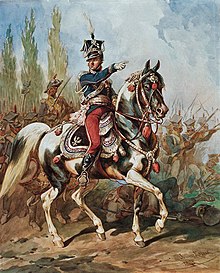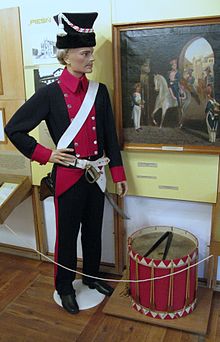
Back Легіёны польскія Byelorussian Полски легиони Bulgarian Légions polonaises German Πολωνικές Λεγεώνες (ναπολεόντεια περίοδος) Greek Polaj Legioj en Italio Esperanto Legiones polacas (periodo napoleónico) Spanish هنگهای لهستانی در عصر ناپلئونی Persian Puolan Legioona Finnish Légions polonaises (armée française) French Legiun Polandia (periode Napoleon) ID





The Polish Legions (Polish: Legiony Polskie we Włoszech; also known as the Dąbrowski Legions)[1] were several Polish military units that served with the French Army in the Napoleonic era, mainly from 1797 to 1803, although some units continued to serve until 1815.
After the Third Partition of Poland in 1795, many Poles believed that Revolutionary France and her allies would come to Poland's aid. France's enemies included Poland's partitioners, Prussia, Austria and Russia. Many Polish soldiers, officers, and volunteers therefore emigrated, especially to the parts of Italy under French rule or serving as client states or sister republics to France (leading to the expression, "the Polish Legions in Italy") and to France itself, where they joined forces with the local military. The number of Polish recruits soon reached many thousands. With support from Napoleon Bonaparte, Polish military units were formed, bearing Polish military ranks and commanded by Polish officers. They became known as the "Polish Legions", a Polish army in exile, under French command. Their best known Polish commanders included Jan Henryk Dąbrowski, Karol Kniaziewicz and Józef Wybicki.
The Polish Legions serving alongside the French Army during the Napoleonic Wars saw combat in most of Napoleon's campaigns, from the West Indies, through Italy and Egypt. When the Duchy of Warsaw was created in 1807, many of the veterans of the Legions formed a core around which the Duchy's army was raised under Józef Poniatowski. This force fought a victorious war against Austria in 1809 and would go on to fight alongside the French army in numerous campaigns, culminating in the disastrous invasion of Russia in 1812, which marked the end of the Napoleonic empire, including the Legions, and allied states like the Duchy of Warsaw.
© MMXXIII Rich X Search. We shall prevail. All rights reserved. Rich X Search